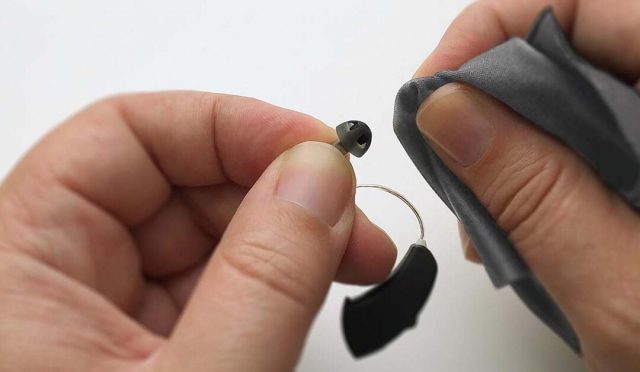
A brush and a wax pick can help to clean your hearing aids, but these items aren’t household staples that you’ll readily have on hand. It might be tempting to forgo your specialized hearing aid cleaning tools in favor of cotton swabs, pen caps, and other similarly-slender objects, but doing so is ill-advised.
Since moisture can damage many hearing aids, be sure to never use rubbing alcohol or any other cleaning solutions unless instructed to do so by your hearing aid specialist. Even liquids that specify hearing aid compatibility are not necessary and should be avoided, as you can easily clear your hearing aid with the help of solid objects such as your wax pick and brush. Some hearing aids, CAN tolerate water, but it’s always best to confirm with a professional before doing so.
When gently wiping your hearing aids free of any blockage, only use a cleaning cloth designated for hearing aids, or a tissue with no additives such as lotions or aloe. You should also take care to avoid wiping debris and blockage into your hearing aids’ microphone parts from another region of the hearing aids.
How to care for your hearing aids after you clean them
Cleaning your hearing aids is vital for making sure that you hear well, but it’s only effective if you care for your hearing aids after you clean them (and before, too). Your primary concern should be avoiding moisture contact, so remember to remove your hearing aids before you shower or wash your face. You should also remove them when using hair and skin sprays and gels that could potentially come in contact with your ears.
Moisture avoidance doesn’t necessarily end with preventing direct water contact. If you live in a humid environment, sweat often, or walk through a rainstorm without an umbrella or a hat, your hearing aids can easily be exposed to excess moisture. Hearing aid dehumidifiers such as desiccant jars and dry & store units can help you continue to care for your hearing aids after you clean them.
You should also store your hearing aids properly when not in use. Keep them out of reach of children or pets when airing them out overnight after cleaning, as the batteries can be poisonous if swallowed.
When leaving hearing aids unused overnight, remove the batteries and keep the battery compartment open overnight to dry. If your hearing aid uses rechargeable batteries, follow your manufacturer’s instructions for docking and recharging.
We hope you enjoyed reading this series on properly cleaning your hearing aids. If you missed any of the previous posts, you can find them here:
How Do You Clean Hearing Aids?
Step By Step Instructions For Cleaning Hearing Aids
How To Clean Popular Hearing Aid Brands
Learn more about hearing aid care with I Love Hearing
Cleaning your hearing aids is only a small part of ensuring that your devices are working properly and will last for years. At I Love Hearing, our leadership team has in-depth experience working hands-on with all major hearing aid brands, so we can advise you on cleaning and maintenance best practices.
Unlike many hearing aid providers that only sell and repair one brand, we carry and repair nearly every hearing aid brand available in the U.S., and particularly in New York City and Long Island. We offer hearing aid fitting, hearing aid repair, ear wax management, and other services that can help you to keep your hearing aids working like they’re brand new year after year. Our team of licensed audiologists and hearing aid specialists operates from offices located throughout the greater New York metro area: in Manhattan’s Upper West Side and throughout Long Island, including Port Washington, New Hyde Park, East Meadow, and Great Neck.
If you have more questions about hearing aid fitting or hearing aid repair, visit the I Love Hearing FAQ page about hearing aids. And if you still have questions, we’d love to help you: Contact us to book an appointment and start your hearing aid journey.